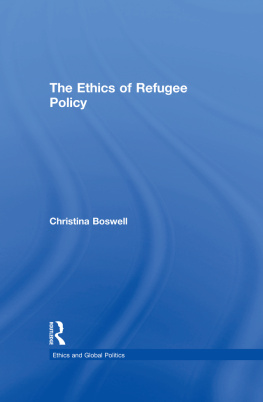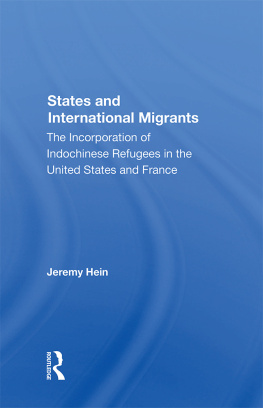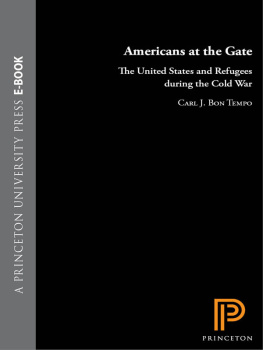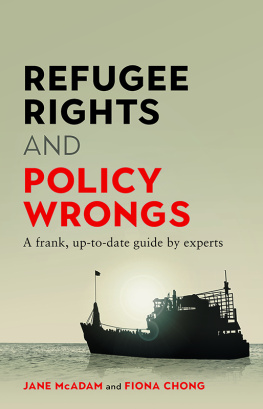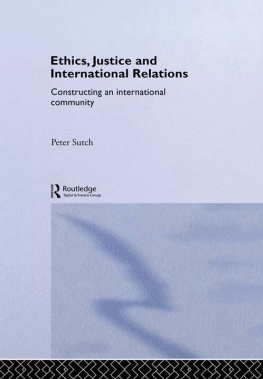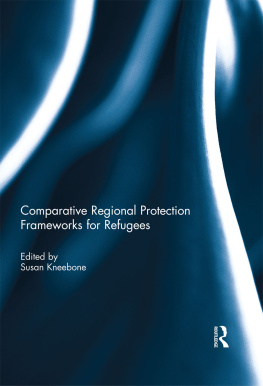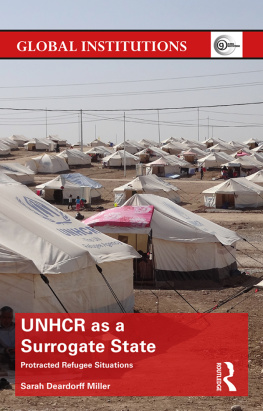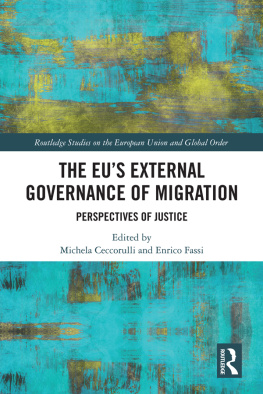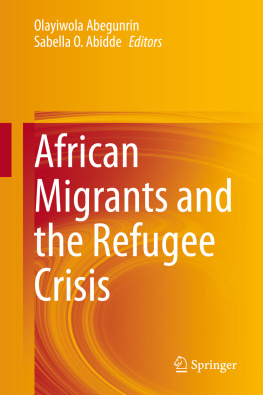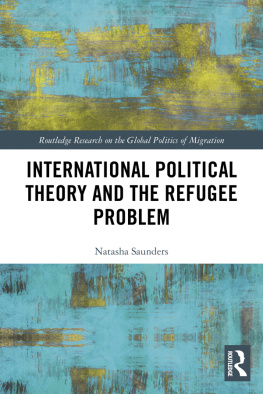THE ETHICS OF REFUGEE POLICY
Ethics and Global Politics
Series Editors: Tom Lansford and Patrick Hayden
Since the end of the Cold War, explorations of ethical considerations within global politics and on the development of foreign policy have assumed a growing importance in the fields of politics and international studies. New theories, policies, institutions, and actors are called for to address difficult normative questions arising from the conduct of international affairs in a rapidly changing world. This series provides an exciting new forum for creative research that engages both the theory and practice of contemporary world politics, in light of the challenges and dilemmas of the evolving international order.
Also in the series
Cosmopolitan Global Politics
Patrick Hayden
ISBN 0 7546 4276 3
Understanding Human Rights Violations
New Systematic Studies
Edited by Sabine C. Carey and Steven C. Poe
ISBN 0 7546 4026 4
International Environmental Justice
A North-South Dimension
Ruchi Anand
0 7546 3824 3
In War We Trust
The Bush Doctrine and the Pursuit of Just War
Chris J. Dolan
0 7546 4234 8
The Ethics of Refugee Policy
Christina Boswell
Migration Research Group, Hamburg Institute of International Economics, Germany
First published 2005 by Ashgate Publishing
Published 2016 by Routledge
2 Park Square, Milton Park, Abingdon, Oxon OX14 4RN
711 Third Avenue, New York, NY 10017, USA
Routledge is an imprint of the Taylor & Francis Group, an informa business
Copyright 2005 Christina Boswell
Christina Boswell has asserted her right under the Copyright, Designs and Patents Act, 1988, to be identified as the author of this work.
All rights reserved. No part of this book may be reprinted or reproduced or utilised in any form or by any electronic, mechanical, or other means, now known or hereafter invented, including photocopying and recording, or in any information storage or retrieval system, without permission in writing from the publishers.
Notice:
Product or corporate names may be trademarks or registered trademarks, and are used only for identification and explanation without intent to infringe.
British Library Cataloguing in Publication Data
Boswell, Christina
The ethics of refugee policy. - (Ethics and global politics)
1.Refugees - Government policy - Moral and ethical aspects 2.Refugees - Legal status, laws, etc. 3.Liberalism
I.Title
325.2'1
Library of Congress Cataloging-in-Publication Data
Boswell, Christina.
The ethics of refugee policy / by Christina Boswell.
p. cm. -- (Ethics and global politics)
Includes bibliographical references and index.
ISBN 0-7546-4519-3
1. Refugees--Government policy--Moral and ethical aspects.
I. Title. II. Series.
HV640.B65 2005
174'.936287--dc22
2005021091
ISBN 9780754645191 (hbk)
This book brings together two deep interests of mine: political philosophy and refugee policy. The two interests were nurtured in rather different settings. My engagement with political philosophy began as an undergraduate in the early 1990s, and had much to do with the stimulating teaching of Adam Swift and Alan Montefiore at Balliol College, Oxford. Later at the London School of Economics and Political Science (LSE) John Charvet, Erika Benner, Chris Brown, and members of the International Political Theory seminar provided an excellent environment for developing and refining my ideas on liberalism and international relations. I also benefited from feedback from my undergraduate students at LSE, especially in the courses on human rights and international political theory.
The interest in refugee issues emerged during the three intervening years between Oxford and LSE, when I worked on the refugee policy scene. I was very lucky to have the opportunity to work with Denis De Jong at the European Commission, and Maria Siemens, Jeff Crisp, Rachel Reilly, Elizabeth Tan, Asmita Naik and Eric Morris in Geneva. Particularly formative was my year as consultant at the Policy Research Unit at the United Nations High Commission for Refugees (UNHCR), where we had many a lively debate on refugee protection. Indeed, it was the ongoing debate between the orthodox guardians of refugee law and the more pragmatist supporters of the direction espoused by the then High Commissioner, Sadako Ogata, that provided the backdrop for the issues discussed in this book. Probably the deepest impression, though, was left by my eight months working with Rwandan refugees for the UNHCR in Burundi in many ways an unsettling experience, and one that deeply influenced my thinking on a range of political and ethical issues.
The book itself is based on research carried out at LSE between 1997-2000, in the International Relations Department. Over this period, James Mayall was very supportive of my work, indeed he initially encouraged me to move back from policy research to academia, a step I certainly do not regret making. I owe a special debt to John Charvet, who was a constant source of constructive criticism and ideas indeed the content of the book should attest to his influence. Chris Brown and Andrew Linklater raised some important questions about the line of argument, which I have sought to address in this book. Other important input came from the late Myron Weiner, B.S. Chimni, Gil Loescher and Brian Barry who offered advice and encouragement in the initial stages of the project; and Maria Lens, Christian Heine, Alex Cols, Erika Benner, Jacob Nell, Raj Patel and Jill Boswell, all of whom commented on individual chapters.
Some of the themes dealt with have been rewritten or supplemented, based on research I have subsequently carried out for the Royal Institute of International Affairs, and at the Migration Research Group in Hamburg. For this, I would like to thank the Le Poer Trust and the European Union Sixth Framework Programme Excellent Grant which helped fund this work. I also owe a debt of gratitude to Thomas Straubhaar, whose institute in Hamburg has provided me with an excellent environment for research. Thanks also to the series editor Tom Lansford, to the anonymous reviewer, and to the editorial team at Ashgate, who did a very professional job.
Finally, both of my parents influenced many of the ideas in this book, albeit in very different and often indirect ways. And Tilman Plehn finally shook me into action to get the work published.
Needless to say, the usual caveat about responsibility for mistakes applies.
Since the revival of liberal political philosophy in the 1970s, liberalism has been the target of attack from a range of critics. Communitarians, post-modernists and critical theorists have all taken a swipe at liberalisms assumptions about the self, society and ethics, as well as its supposed neutrality between different conceptions of the good. Many liberal theorists have responded astutely to this critique, acknowledging the historical contingency of liberalism, and re-grounding liberal theory on a non-metaphysical basis.
Yet one set of problems in liberal theory has remained relatively neglected: the question of the practical feasibility of liberal theories of ethics. The problem can be simply stated as follows. If we were to apply the demands of most liberal political theories consistently, they would generate extensive ethical obligations to others. Liberal theories of rights, justice or humanitarianism tend to call for quite far-reaching duties with often radically redistributive implications. And, since liberalism typically has little to say about the ethical relevance of communities or nation-states, it has difficulties justifying the restriction of such obligations to particular groups of people. Liberal theory is in a weak position when it comes to delimiting the scope of justice, rights or humanitarian duties to the national sphere. But once such rights or concepts of justice are applied to international questions of human rights, distributive justice or humanitarian assistance, then liberal theory faces a serious problem of feasibility.

